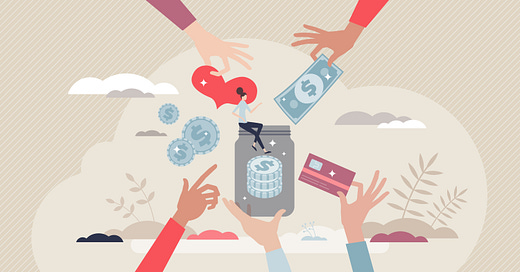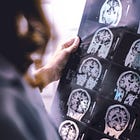Research Hit: A Brain Region For Generosity
Region deep in the brain shown to modulate generosity to others
Do we really have a region for generosity in the brain?
No, not precisely but these researchers have certainly found a region that seems to modulate generosity.
Ok, tell me more!
And it’s a region that many of you may not associate with generosity - certainly to lay audiences. If you’ve heard of it, you probably associate it with fear and threat.
The amygdala?
Yes, precisely, we do know that the amygdalae (there’s two of them, one on each side of the brain) is associated with much more than fear and threat, but does activate strongly to that. But this is a fascinating study because it studied a population of individuals with a rare disease known as Urbach-Wiethe disease. This selectively targets a region of the amygdalae (including other bodily targets), the basolateral amygdala.
And this is involved in generosity?
Seemingly so but in a special way. Tobias Kalenscher of Heinrich Heine University Düsseldorf collaborated with colleagues from the universities in Lausanne, Utrecht and Cape Town to investigate effects of social decision making of those with Urbach-Wiethe disease. This would normally be difficult to get enough participants but there is a cluster of Urbach-Wiethe cases in South Africa.
This follows on from research into rats (and humans) that shows involvement of the basolateral amygdala in aspects of sociality and callousness.
And how did they investigate generosity?
They did this with a common approach in psychology research of playing the “dictator game”. This is when individuals, the “dictator” are given a sum of money and can distribute this to others as they see fit. They don’t have to, hence the name “dictator”. We know from decades of research how people tend to distribute the money (normally giving away 20-30%).
Here they looked at how much participants were willing to share, with no obligation, with others that are close to them i.e. friends, or those that are more distant to them socially.
And what were the results?
The results, interestingly, showed that those with Urbach-Wiethe disease shared the same amounts with friends, those they were close to socially, but this dropped off rapidly with social distance in contrast to healthy individuals.
So it seems as if the basolateral amygdala is calibrating some aspects of sociality specifically generosity to those who are not socially close to yourself.
So the amygdala is also a social centre?
I have written previously that the amygdala is more of a focusing centre but here it is involved in generosity to others, especially those who are more distant to ourselves.
Remember though that the brain’s social network is complex and includes multiple regions - some with more specific functions. For a review you can read this:
So if you are less inclined to help those distant from you, it could be your basolateral amygdala at play?
Yes, indeed. Fortunately, mine seems to be functioning well enough!
Reference
Tobias Kalenscher, Luca M. Lüpken, Ron Stoop, David Terburg, Jack van Honk.
Steeper social discounting after human basolateral amygdala damage.
PNAS, 2025
DOI: 10.1073/pnas.2500692122





